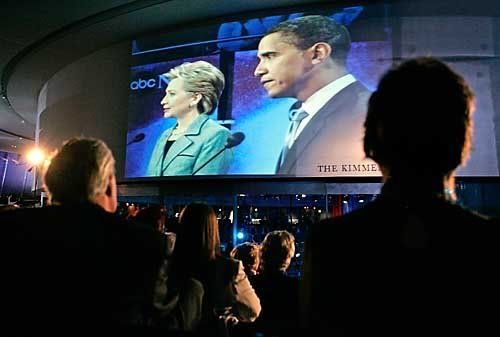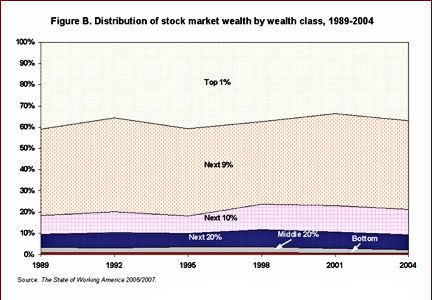
AP: Jae C. Hong
After watching last night's debate, I had a different perspective than the media--both candidates exhibited an incredible lack of knowledge about U.S. history. Maybe we need a historian for President instead of a lawyer.
Had either candidate possessed even a bare awareness of American history, particularly the history of the Presidency, he or she would have won the debate hands down, because with a little knowledge of American history we viewers would have had better answers to many of the questions.
Of course, had any knowledge of American history governed that so-called debate it would have pointed out one of the questioners was Bill Clinton's former former political advisors. That ABC saw nothing wrong with this and Stephanopoulos did not see fit to excuse himself, shows how low journalistic ethics have fallen in television land.
The candidates' lack of knowledge about American history is only part of larger trend that any history professor or teacher knows intimately. Every so often a survey appears that again demonstrates the abysmal knowledge Americans have of their past. They mix up Joe McCarthy and Gene McCarthy, World War II and Vietnam, and even segregation and integration. Every history teacher has enough stories about students getting the past all wrong to fill an entertaining book.
Many of these mistakes seem humorous, but their consequences are anything but. When we mix up our Sunnis and Shiites, Al Qaeda and Al Qaeda in Mesopotamia it has global ramifications. The consequences of our lack of historical knowledge unfortunately were on full display last night by candidates and questioners.
The first example of this came during the atrocious opening of the debate which went on to consume almost half the evening as both moderators and candidates failed to ask a single policy question, but instead focused on personal issues: Obama's "bitterness" remarks, Clinton's Bosnia "misstatement, Obama's former pastor, a person who served on the same board as Obama.
The stench of the dirty laundry pervaded our living room. Had either candidate possessed even an elementary knowledge of American history, this "guilt by association" series of questions could have quickly been silenced. Any American history student, of course knows about Joe McCarthy and the blacklist as well as other examples of guilt by association that rank as some of the uglier manifestations of our past.. My favorite example of this is when the McCarthy crowd tried to go after Lucille Ball, her then-husband Desi Arnaz gave a heart felt speech about his wife that included the line, "The only thing red about Lucy is her hair."
One longed for one of the candidates to say they thought the nation had grown up since the days of Joe McCarthy, especially since the Democratic Party has suffered more from guilt by association tactics than the Republicans. In the 2004 election, the heirs of Joe McCarthy even doctored a photo of an anti-Vietnam War rally to put Jane Fonda and John Kerry in the same picture.
The most painful example of the candidates' "F" in American history came later in the debate when Charles Gibson asked about Iraq.
So if the military commanders in Iraq came to you on day one and said this kind of withdrawal would destabilize Iraq, it would set back all of the gains that we have made, no matter what, you're going to order those troops to come home?
Both candidates answered the question like the lawyers they are, pointing out that the President is Commander-in-Chief, but neither of them cited the numerous examples from American history in which generals speaking out about strategy were regarded as insubordinate to their Commander-in-Chief.
As any American history major can tell you, probably the most famous example of this was Harry Truman's firing of Douglas MacArthur. I quote Truman's full speech on this because we seem to have forgotten its central point in recent years:
With deep regret I have concluded that General of the Army Douglas MacArthur is unable to give his wholehearted support to the policies of the United States Government and of the United Nations in matters pertaining to his official duties. In view of the specific responsibilities imposed upon me by the Constitution of the United States and the added responsibility which has been entrusted to me by the United Nations, I have decided that I must make a change of command in the Far East. I have, therefore, relieved General MacArthur of his commands and have designated Lt. Gen. Matthew B. Ridgway as his successor.
Full and vigorous debate on matters of national policy is a vital element in the constitutional system of our free democracy. It is fundamental., however, that military commanders must be governed by the policies and directives issued to them in the manner provided by our laws and Constitution. In time of crisis, this consideration is particularly compelling.
General MacArthur's place in history as one of our greatest commanders is fully established. The nation owes him a debt of gratitude for the distinguished and exceptional service which he has rendered his country in posts of great responsibility. For that reason I repeat my regret at the necessity for the action I feel compelled to take in his case.
American history buffs can all cite other examples where military commanders crossed the line--Patton in World War II, Curtis LeMay's outrageous plea to use the nuclear option in Vietnam, and, of course, the many travails Abraham Lincoln had with his generals, one of whom had the temerity to run against him after being dismissed from his post as commander of the Army of the Potomac.
History buffs also know well that the line between the military and civilian control of the military has never been a comfortable one, but the War in Iraq seems to have taken this conflict to another level. Suddenly it is the commanders on the ground who have become the dictators of our policy, rather than the instruments of it. The fawning over General Petraeus by members of both parties seemed to turn the line between military and civilian control upside down.
What virtually no one acknowledged was that the situation put Petraeus in an untenable position. It's like asking one of his generals to testify what he thinks about Petraeus. Petraeus is bound by the Constitution to carry out the orders of George W. Bush no matter what he thinks of them.
An article by military historian Richard H. Kohn in the Naval War College Review made the case:
In recent years civilian control of the military has weakened in the United States and is threatened today. The issue is not the nightmare of a coup d'etat but rather the evidence that the American military has grown in influence to the point of being able to impose its own perspective on many policies and decisions. What I have detected is no conspiracy but repeated efforts on the part of the armed forces to frustrate or evade civilian authority when that opposition seems likely to preclude outcomes the military dislikes.
But the staffs of candidates almost never include historians today, instead taking strategy suggestions from pollsters and hired guns who probably wouldn't know Franklin from Theodore Roosevelt. So this article passed by Obama and Clinton, which is interesting because one of its points is that this erosion began not with George W. Bush, but Bill Clinton.
With neither candidate able to summon evidence from American history to bolster their arguments, it left Americans watching the debate to choose between two lawyers trying to make their case. Without the perspective of the past, anyone who watched that debate was left adrift in the present, blown about by the cross currents of prejudice, public opinion, and personality.
The lack of historical perspective figured in another key issue--that of Iran's potential possession of nuclear weapons. Here it is simply appalling that neither candidate could cite the most critical moment of the last half century--the Cuban missile crisis. There may be no more relevant situation for the lessons it has to teach than Iran. Yet neither candidate summoned up a parallel that was one of their past Democratic President's shining moments.
Historical ignorance even came from the mouths of the moderators themselves. The pretentious Charles Gibson, who feigns a Professor Kingsfield manner with his glasses and his tone, made the following statement:
MR. GIBSON: But history shows that when you drop the capital gains tax, the revenues go up.
Mr. Gibson, may I direct your attention to a 2002 report of the Congressional Budget Office. Since you obviously have not read it here is its conclusion, whose economic language may be a bit thick for a brain that did not conduct proper research:
The relationship of realizations and receipts to gains tax rates is neither predictable nor obvious. And while reductions in the overall taxation of capital income can measurably increase economic growth, a cut in capital gains taxes alone is likely to produce much smaller macroeconomic effects. Inaccuracies in projecting revenue and disagreements about the effects of tax changes stem not from a failure to incorporate the behavioral responses of asset holders but from the complexities inherent in the nature of gains and gains realizations.
Gibson also dropped a misleading statistic that would get him soundly reprimanded in any freshman history course when he in essence argued against dropping the capital gains tax:
100 million people in this country own stock and would be affected.
A hundred million people may own some stock, but who controls most of it? If Gibson didn't know the answer when he asked the question he should be summarily dismissed. If he did, someone in the news department ought to remind him about basic journalistic ethics. The following graph from Ezra Klein shows the relevant evidence in dramatic fashion:

Talk about equality! As you can see, the top 1% control 40% of all stocks, with the top 10% controlling an astounding 80%. In other words, an increase in the capital gains tax will primarily impact the rich!
But a historian could have helped here by pointing out the primary purpose of the income tax in the first place was not to tax wages people earned by slaving away from dawn till dusk but to level the playing field by including income such as capital gains.
The lack of historical knowledge on exhibit last night by both candidates and their questioners represents a sad state for this nation, for how can someone purport to govern who has not studied the history of this nation? Perhaps someone will get the point that that is why we are in such a mess.
Labels: Ralph Brauer
mrbubs:
I apologize for letting your comment go unanswered but I was dealing with some idiots at another site where the essay was posted.
Your comment is really high praise. I hope you will go on and get that history PhD. Jeremy's essay after this one on Hillary Clinton's "F" is another example of the sorry state of things.
Curiously your comment reminds me of my son who did a dual degree in history and political science and now is working for Americorps in DC.
Perhaps someone needs to do an essay for this site about academics in politics. My own state of Minnesota had two very good ones (among others) in Paul Wellstone and Hubert Humphrey.
Best of luck to you. If you have time think about posting on this site every so often.







This is really excellent. The only thing more disturbing than ignorance would be if the candidates knew this history but refrained from discussing it out of a desire not to seem too "elitist" or "learned." When History is a cable channel, anything is possible.
I hope this piece is seen by a wider audience.